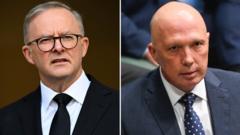With a three-seat majority at stake, both Prime Minister Albanese and Opposition Leader Dutton gear up for a fiercely contested race.
Australia Set for Federal Election on May 3, Political Climate Heats Up

Australia Set for Federal Election on May 3, Political Climate Heats Up
The federal election will foreground vital issues like cost of living and immigration as major parties vie for control.
As the political landscape in Australia intensifies, Prime Minister Anthony Albanese has confirmed that the federal election will take place on May 3rd. After visiting the Governor-General in Canberra, Albanese is set to defend a fragile three-seat majority for the Labor Party, amid a backdrop of closely contested opinion polls.
Both major parties—Labor and the Liberal-National coalition—are gearing up for a competitive battle; a scenario predicted to involve independent MPs or minor parties in any potential coalition formation. The last federal election in 2022 saw these smaller factions secure a historic share of votes, indicating a shifting landscape in Australian politics that will likely come into play once again.
Key issues driving the upcoming election debate include the rising cost of living, which is weighing heavily on Australian households. Concerns surrounding healthcare access, housing affordability, and rising crime rates will also dominate discussions. While climate action was a pivotal topic in the previous election, economic challenges and public safety appear to be more pressing in voters' minds this time around.
Albanese has rolled out plans aimed at addressing the immediate economic concerns, including initiatives to increase free healthcare visits and lower taxes for everyday Australians. He contends that a vote for Dutton would signal a regression in progress for the nation. However, opposition leader Peter Dutton has positioned his party as the one with effective solutions, pledging to restore economic stability and enforce stricter crime control measures.
Traditionally, Australian politics has been a two-horse race between Labor and the Liberal-National coalition. To form a majority government, one party must secure at least 76 of the 150 seats in the House of Representatives, the chamber where the Prime Minister serves.
Albanese, who ascended to leadership in 2022, has been a prominent figure in Australian politics since the 1990s, pledging to unify the nation and end the divisive "climate wars." His administration recently established an ambitious emissions reduction target, although many experts assert that further initiatives are necessary to address environmental issues.
Nevertheless, Albanese's aspirations for constitutional recognition of Aboriginal and Torres Strait Islander peoples faltered during the 2023 referendum, and he faces mounting scrutiny regarding the global economic downturn’s contribution to the country's current financial challenges. His reputation faced additional strain over a controversial real estate purchase amid a national housing crisis.
Matching Albanese's experience is the opposition leader Dutton, a former police officer with a lengthy 20-year tenure in parliament, renowned for taking on controversial asylum seeker policies during his time in key ministerial roles. While he has characterized himself as a staunch conservative, Dutton is attempting to soften his public image, arguing that it does not truly represent his identity.
As campaigning intensifies ahead of the elections, all eyes will be on both party leaders to see how they address key voter concerns and position themselves in a quickly evolving political climate.
Both major parties—Labor and the Liberal-National coalition—are gearing up for a competitive battle; a scenario predicted to involve independent MPs or minor parties in any potential coalition formation. The last federal election in 2022 saw these smaller factions secure a historic share of votes, indicating a shifting landscape in Australian politics that will likely come into play once again.
Key issues driving the upcoming election debate include the rising cost of living, which is weighing heavily on Australian households. Concerns surrounding healthcare access, housing affordability, and rising crime rates will also dominate discussions. While climate action was a pivotal topic in the previous election, economic challenges and public safety appear to be more pressing in voters' minds this time around.
Albanese has rolled out plans aimed at addressing the immediate economic concerns, including initiatives to increase free healthcare visits and lower taxes for everyday Australians. He contends that a vote for Dutton would signal a regression in progress for the nation. However, opposition leader Peter Dutton has positioned his party as the one with effective solutions, pledging to restore economic stability and enforce stricter crime control measures.
Traditionally, Australian politics has been a two-horse race between Labor and the Liberal-National coalition. To form a majority government, one party must secure at least 76 of the 150 seats in the House of Representatives, the chamber where the Prime Minister serves.
Albanese, who ascended to leadership in 2022, has been a prominent figure in Australian politics since the 1990s, pledging to unify the nation and end the divisive "climate wars." His administration recently established an ambitious emissions reduction target, although many experts assert that further initiatives are necessary to address environmental issues.
Nevertheless, Albanese's aspirations for constitutional recognition of Aboriginal and Torres Strait Islander peoples faltered during the 2023 referendum, and he faces mounting scrutiny regarding the global economic downturn’s contribution to the country's current financial challenges. His reputation faced additional strain over a controversial real estate purchase amid a national housing crisis.
Matching Albanese's experience is the opposition leader Dutton, a former police officer with a lengthy 20-year tenure in parliament, renowned for taking on controversial asylum seeker policies during his time in key ministerial roles. While he has characterized himself as a staunch conservative, Dutton is attempting to soften his public image, arguing that it does not truly represent his identity.
As campaigning intensifies ahead of the elections, all eyes will be on both party leaders to see how they address key voter concerns and position themselves in a quickly evolving political climate.




















